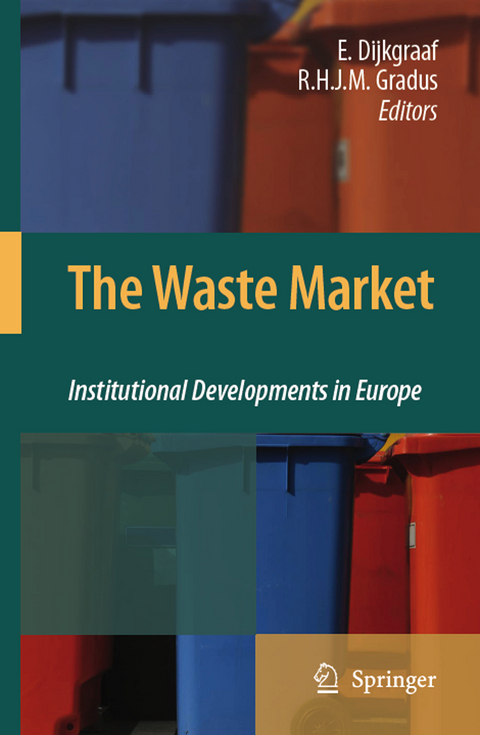
The Waste Market
Institutional Developments in Europe
Seiten
2010
|
Softcover reprint of hardcover 1st ed. 2008
Springer (Verlag)
978-90-481-7963-3 (ISBN)
Springer (Verlag)
978-90-481-7963-3 (ISBN)
Since 1960 the importance of the waste sector has increased substantially both in the waste streams and the costs of waste collection and treatment. 2 Empirical Update of the Waste Collection Market The Dutch case provides a nice example why studying the waste market is int- esting from an economic point of view.
E. Dijkgraaf and R. H. J. M. Gradus 1. 1 Introduction In 2004 Elbert Dijkgraaf nished a PhD-thesis ‘Regulating the Dutch waste market’ at the Erasmus University Rotterdam. It was interesting that not much is published about the waste market, although it is a very important sector from an economic and environmental viewpoint. In 2006 we were participants at a very interesting conf- ence on Local Government Reform: privatization and public-private collaboration in Barcelona organized by Germa ` Bel. It was interesting to notice that researchers from Spain, Scandinavian countries, the UK and the USA were studying this issue as well. From this we brought forward the idea to publish a book about the waste market. Because of its legal framework we want to focus on Europe. In this chapter we give an introduction to this book. In the next paragraph we present a short overview of the waste collection market. Since 1960 the importance of the waste sector has increased substantially both in the waste streams and the costs of waste collection and treatment. Furthermore, we discuss policy measures to deal with these increases and give an overview of the different measures in - countries. In the last paragraph we present different chapters of our book. 1. 2 Empirical Update of the Waste Collection Market The Dutch case provides a nice example why studying the waste market is int- esting from an economic point of view.
E. Dijkgraaf and R. H. J. M. Gradus 1. 1 Introduction In 2004 Elbert Dijkgraaf nished a PhD-thesis ‘Regulating the Dutch waste market’ at the Erasmus University Rotterdam. It was interesting that not much is published about the waste market, although it is a very important sector from an economic and environmental viewpoint. In 2006 we were participants at a very interesting conf- ence on Local Government Reform: privatization and public-private collaboration in Barcelona organized by Germa ` Bel. It was interesting to notice that researchers from Spain, Scandinavian countries, the UK and the USA were studying this issue as well. From this we brought forward the idea to publish a book about the waste market. Because of its legal framework we want to focus on Europe. In this chapter we give an introduction to this book. In the next paragraph we present a short overview of the waste collection market. Since 1960 the importance of the waste sector has increased substantially both in the waste streams and the costs of waste collection and treatment. Furthermore, we discuss policy measures to deal with these increases and give an overview of the different measures in - countries. In the last paragraph we present different chapters of our book. 1. 2 Empirical Update of the Waste Collection Market The Dutch case provides a nice example why studying the waste market is int- esting from an economic point of view.
Cost Savings of Contracting Out Refuse Collection in The Netherlands.- Contracting Out Refuse Collection in The Netherlands.- Contracting Out in Sweden: Ownership and Production Costs.- Does Public Ownership Impair Efficiency in Norwegian Refuse Collection?.- Refuse Collection in Spain: Privatization, Intermunicipal Cooperation, and Concentration.- How to Get Increasing Competition in the Dutch Refuse Collection Market?.- Dutch Cost Savings in Unit-Based Pricing of Household Waste.- Assessing Instruments for Mixed Household Solid Waste Collection Services in Flanders.- Final Comments and Future Research.
| Zusatzinfo | VIII, 160 p. |
|---|---|
| Verlagsort | Dordrecht |
| Sprache | englisch |
| Maße | 155 x 235 mm |
| Themenwelt | Naturwissenschaften ► Biologie ► Ökologie / Naturschutz |
| Technik ► Umwelttechnik / Biotechnologie | |
| Wirtschaft ► Volkswirtschaftslehre ► Ökonometrie | |
| ISBN-10 | 90-481-7963-7 / 9048179637 |
| ISBN-13 | 978-90-481-7963-3 / 9789048179633 |
| Zustand | Neuware |
| Haben Sie eine Frage zum Produkt? |
Mehr entdecken
aus dem Bereich
aus dem Bereich


